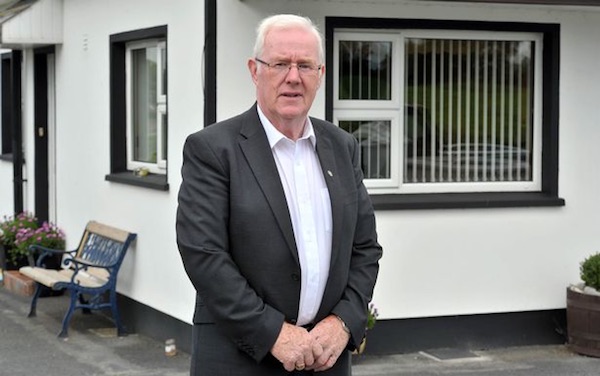
A slur against a peace campaigner that remained on the record of the London parliament for 21 years has finally been corrected.
A claim by former First Minister and DUP leader Ian Paisley that County Armagh man Eugene Reavey (pictured) was involved in the 1976 Kingsmill massacre has been described as “utterly false” at Westminster.
The killing of ten workmen came a day after two of Mr Reavey’s brothers, John Martin and Brian, were shot dead by members of the Glenanne Gang, which included members of the Crown Forces and unionist paramilitaries, at their family home near Whitecross in south Armagh.
A third brother, 17-year-old Anthony, died several weeks later from his injuries.
In 2016 it emerged that a dossier of Crown force briefing papers on the Kingsmill attack seen by Paisley had been doctored to include members of Catholic south Armagh farming families.
It emerged that a briefing note was altered by a person with close links to the British Army to blacken the name of Mr Reavey and his family in order to justify the sectarian murders of his brothers the previous day.
In a Westminster debate this week, Labour MP Conor McGinn, from South Armagh, rubbished the allegations made about Mr Reavey.
Mr McGinn, who is an MP for St Helens in England and Labour’s shadow security minister, challenged Mr Paisley’s claims, which were never retracted.
“Whatever the motivation behind making the allegation, it caused incredible pain and it was completely and utterly false,” he said.
“The police, including the then Chief Constable, as well as historical enquiries investigations are very clear that Eugene Reavey had no involvement whatsoever in Kingsmill.
“I think it is right that the record is corrected here today.”
SDLP leader Colum Eastwood, who sponsored the debate, also described the accusation as “scurrilous”.
“Eugene Reavey is one of the most decent upstanding people I know and what was said about him was absolutely wrong, totally hurtful and why anybody would think that you pile more pain onto a family, one of many families, and think that would have some sort of value, I just do not understand,” he said.
A British government minister in the ‘Northern Ireland’ Office thanked Mr McGinn for raising Mr Reavey’s case and noted “that the PSNI’s Historical Enquiries Team found no wrong-doing whatsoever by Eugene Reavey in the incident that he raises”.
Mr Reavey said afterwards: “The record now states that I am an innocent man.”
![[Irish Republican News]](https://republican-news.org/graphics/title_gifs/rn.gif)
![[Irish Republican News]](https://republican-news.org/graphics/title_gifs/harp.gif)

